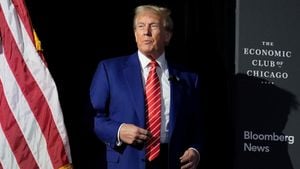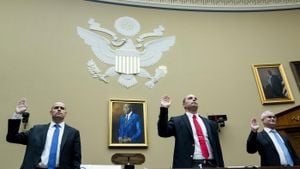President-elect Donald Trump has thrown the Pentagon and the defense world for a loop by nominating Pete Hegseth, known for his role as the co-host on Fox News Channel’s "Fox & Friends Weekend," as the new Secretary of Defense. This unexpected move has raised eyebrows among political insiders, especially considering Hegseth's relatively limited experience on the global stage, making many wonder how he will navigate running the world’s most powerful military.
The announcement has been met with surprise and concern throughout Washington. Many expected Trump to select from established figures well-versed in national security. Yet, he opted for Hegseth, who is also an Army National Guard officer, leaving some politicians scratching their heads. While some Republicans praised Hegseth for his combat experience, others were less convinced of his suitability for the role. Lawmaker reactions have varied from cautious support to outright skepticism about his preparedness.
What sets Hegseth apart is not only his military background but also his controversial views. Throughout his television appearances and interviews, he’s made his disdain for "woke" programs promoting equity and inclusion abundantly clear. His stance aligns with Trump’s agenda, raising the possibility of significant changes within the military, particularly concerning the integration of women and diversity initiatives.
Hegseth has previously stated, "Everything about men and women serving together makes the situation more complicated, and complication in combat, which means casualties are worse." This comments about women’s roles have sparked backlash from advocates for gender equality within the military. His perspectives on this topic seem to reflect the sentiments echoed by Trump, who has indicated his intent to revert military policies to more traditional frameworks.
Hegseth's defense of his views came during his time on “The Shawn Ryan Show,” where he expressed concern over combat roles being opened to women, arguing it would compromise military effectiveness. His suggested prioritization of battlefield efficacy over progressive reform has starkly contrasted against the military’s recent push for inclusivity since all combat roles were officially opened to women by then-Defense Secretary Ash Carter back in 2016.
Although he touts himself as being “tremendously capable,” he has yet to demonstrate the kind of policy-making experience typical for someone heading the Pentagon. The Department of Defense oversees approximately 1.3 million active-duty troops and manages a staggering budget exceeding $800 billion. Critics, including Rep. Adam Smith, ranking Democrat on the House Armed Services Committee, have urged skepticism about Hegseth's capabilities to lead such a mammoth organization effectively.
Smith remarked, "There is reason for concern… running the Pentagon requires many skill sets, and he needs to articulate his plans to gain the confidence of lawmakers.” This sentiment reflects broader worries among commentators and military experts questioning the potential for effective leadership from someone who has largely been involved with media rather than executive governance.
The doubts about Hegseth's qualifications come as Trump appears increasingly frustrated with traditional military leadership. Analysts speculate the selection may have more to do with loyalty than capability—an impression bolstered by the personal rapport he shares with Trump. Since becoming close during Hegseth’s time at Fox, the new defense nominee has often been seen as aligning with Trump’s “America First” policies.
Some observers fear the confirmation process might not just hinge on Hegseth’s military experience but will also bring to light his views on controversial issues, such as the military's handling of diversity and inclusivity, as well as his role advising Trump on matters related to war crimes. Hegseth has been implicated in advocating for presidential pardons for service members charged with war crimes—a position fraught with ethical and legal complications.
Military officials have also expressed unease over Hegseth's potential appointment. One senior military officer, who opted to remain anonymous, noted, "This came out of the blue. There are significant concerns about whether he has the practical experience needed to manage such a vast department."
Trump’s choice has provoked strong responses across party lines, with reactions from his own party leaning toward subtle apprehension. For example, Sen. Thom Tillis of North Carolina characterized the selection as “interesting” yet did not elaborate on its merits, and Indiana Sen. Todd Young expressed uncertainty over Hegseth's vision, indicating he would like to learn more about his plans before supporting the nomination.
Meanwhile, House Speaker Mike Johnson has provided support, stating Hegseth brings “a lot to the table” and will focus on necessary reforms. Yet, the broader diplomatic and military ramifications of his potential leadership could be extensive. Beyond managing personnel and budgetary concerns, Hegseth will have to contend with various international challenges, including the North Korean threat, the tumultuous situation in the Middle East, and the complex geopolitics surrounding the conflict with Russia.
Trump publicly praised Hegseth as “tough, smart, and a true believer” of the America First doctrine, hinting at how he perceives Hegseth's past military service as just one piece of what he hopes will be bold and transformative leadership at the Pentagon. Nevertheless, Hegseth's confirmation hearing is likely to become the stage for significant scrutiny of not only his qualifications but also the underlying ideologies he would bring to one of the most challenging jobs in the U.S. government.
With the Pentagon facing simultaneous crises, from advancing military technology and alliances to reinvigorated competition with China, the selection of Hegseth could signal either continuity or considerable upheaval within the U.S. defense strategy.



